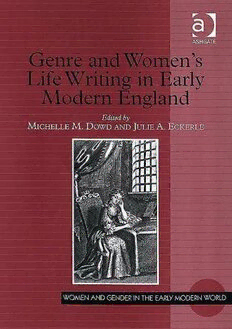
Genre and Women's Life Writing in Early Modern England (Women and Gender in the Early Modern World) PDF
225 Pages·2007·1.292 MB·English
Most books are stored in the elastic cloud where traffic is expensive. For this reason, we have a limit on daily download.
Preview Genre and Women's Life Writing in Early Modern England (Women and Gender in the Early Modern World)
Description:
By taking account of the ways in which early modern women made use of formal and generic structures to constitute themselves in writing, the essays collected here interrogate the discursive contours of gendered identity in sixteenth- and seventeenth-century England. The contributors explore how generic choice, mixture, and revision influence narrative constructions of the female self in early modern England. Collectively they situate women's life writings within the broader textual culture of early modern England while maintaining a focus on the particular rhetorical devices and narrative structures that comprise individual texts. Reconsidering women's life writing in light of recent critical trends - most notably historical formalism - this volume produces both new readings of early modern texts (such as Margaret Cavendish's autobiography and the diary of Anne Clifford) and a new understanding of the complex relationships between literary forms and early modern women's 'selves'. This volume engages with new critical methods to make innovative connections between canonical and non-canonical writing; in so doing, it helps to shape the future of scholarship on early modern women.
See more
The list of books you might like
Most books are stored in the elastic cloud where traffic is expensive. For this reason, we have a limit on daily download.
